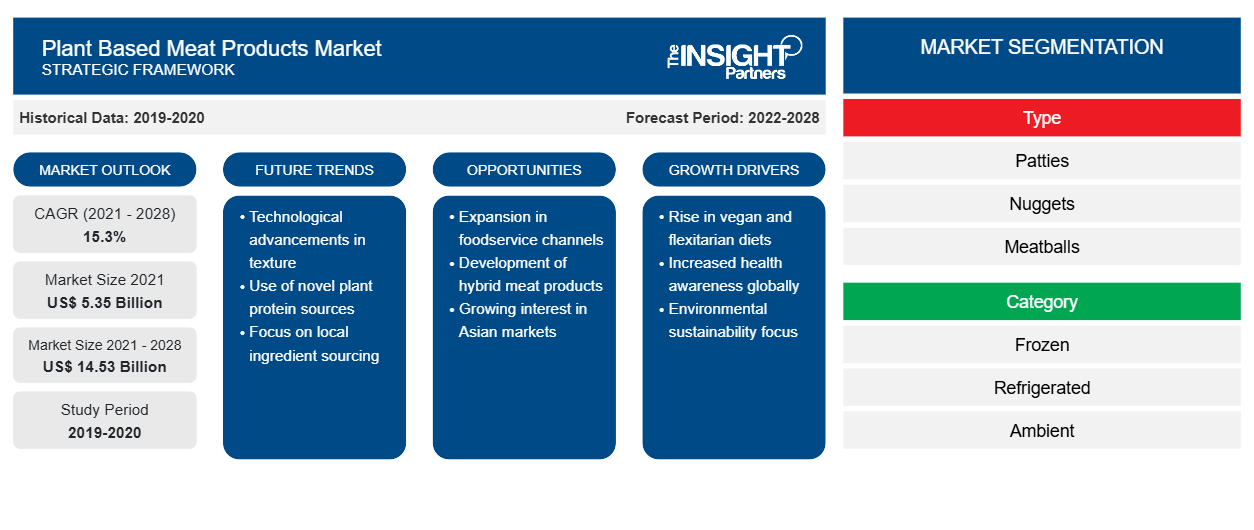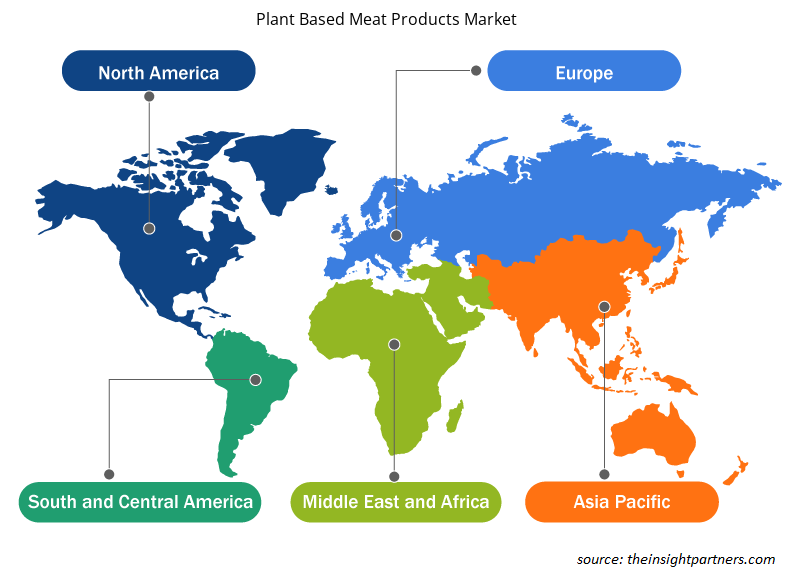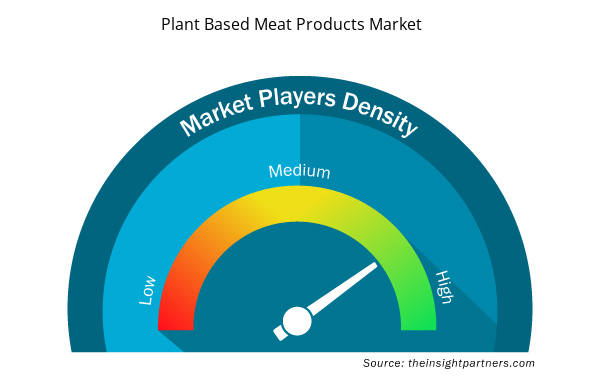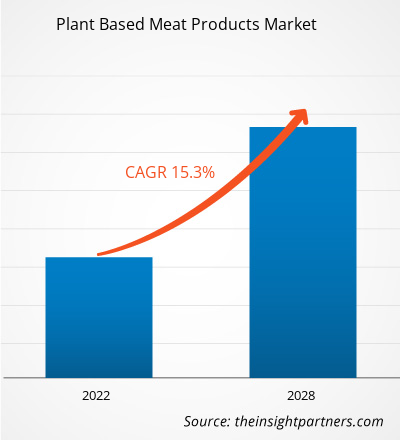[Research Report] The Plant Based Meat Products market is projected to reach US$ 14,527.55 million by 2028 from US$ 5,354.72 million in 2021; it is expected to grow at a CAGR of 15.3% from 2021 to 2028.
Market Insights and Analyst View:
Plant-based meat products are made using plant proteins such as soy protein, pea protein, and wheat protein. Soy protein is widely used to make plant based meat products as it is affordable than other plant proteins and it provides ideal texture to the products which is similar to conventional animal meat products. Patties, nuggets, sausages, and meatballs are some of the common plant based meat products available in the market. Consumers are highly inclined toward plant based or vegan-friendly products owing to increased health concerns and rising awareness regarding animal welfare. The rising health-consciousness among people owing to increasing prevalence of obesity, diabetes, and other diseases is compelling people to change their dietary habits. People generally perceive plant based products to be healthier than the conventional animal-based products. This factor is significantly driving the growth of plant based meat products market
Growth Drivers and Challenges:
Plant-based meat products are lower in saturated fat and calories than conventional meat products, making them a healthier choice. This factor is driving the growth of the plant based meat products market. The rise of the veganism trend is also attributed to increasing empathy toward animals. The rising awareness regarding the ill-treatment of animals in slaughterhouses and factories has raised concerns about animal protection among consumers. This factor is also expected to boost the consumption of plant based food, driving the plant based meat products market. However, its high price is limiting its uptake among price-sensitive consumers. At leading supermarket chains, such as Kroger and Walmart, two plant based hamburger patties from Beyond Meat can be purchased for around US$ 5.99. On the other hand, 2 pounds of ground beef is available for approximately the same price, which could produce 10 times more hamburger patties. Thus, after comparing the prices, consumers generally end up buying conventional meat instead of plant based meat, which is an obstruction in the plant based meat products market growth. Manufacturers are focusing to achieve economies of scale to reduce the overall cost required for manufacturing plant based meat products. Such initiative may help the manufacturers to acquire new customers even in the price sensitive markets.
Customize This Report To Suit Your Requirement
You will get customization on any report - free of charge - including parts of this report, or country-level analysis, Excel Data pack, as well as avail great offers and discounts for start-ups & universities
Plant Based Meat Products Market: Strategic Insights

- Get Top Key Market Trends of this report.This FREE sample will include data analysis, ranging from market trends to estimates and forecasts.
You will get customization on any report - free of charge - including parts of this report, or country-level analysis, Excel Data pack, as well as avail great offers and discounts for start-ups & universities
Plant Based Meat Products Market: Strategic Insights

- Get Top Key Market Trends of this report.This FREE sample will include data analysis, ranging from market trends to estimates and forecasts.
Report Segmentation and Scope:
The “Global Plant Based Meat Products Market” is segmented based on type, category, distribution channel, and geography. Based on type, the plant based meat products market is segmented into patties, nuggets, meatballs, sausages, and others. Based on category, the plant based meat products market is segmented into frozen, refrigerated, and ambient. Based on distribution channel, the plant based meat products market is segmented into supermarkets and hypermarkets, convenience stores, online retail, and others. The plant based meat products market based on geography is segmented into North America (US, Canada, and Mexico), Europe (Germany, France, Italy, UK, Russia, and Rest of Europe), Asia Pacific (Australia, China, Japan, India, South Korea, and Rest of Asia Pacific), Middle East & Africa (South Africa, Saudi Arabia, UAE, and Rest of Middle East & Africa), and South & Central America (Brazil, Argentina, and Rest of South & Central America)
Segmental Analysis:
Based on type, the plant based meat products market is segmented into patties, nuggets, meatballs, sausages, and others. In 2021, the patties segment held the largest share in the plant based meat products market.
Based on distribution channel, the plant based meat products market is segmented into supermarkets and hypermarkets, convenience stores, online retail, and others. The supermarkets and hypermarkets segment held the largest market share in 2021 and the online retail segment is expected to register the highest CAGR over the forecast period. Online retail is one of the fastest-growing distribution channels owing to its convenience in terms of shopping and product delivery. Online retail stores offer a wide variety of products with heavy discounts; also, consumers can conveniently buy desirable products remotely. Home delivery service attracts a large group of customers to shop through an e-commerce platform. E-commerce websites offer detailed product information, along with user reviews, which help buyers compare products and make informed decisions. These factors are significantly driving the segment’s growth over the upcoming years.
Regional Analysis:
Based on geography, the plant based meat products market is divided into five key regions: North America, Europe, Asia Pacific, South & Central America, and Middle East & Africa. The global plant based meat products market size for Europe accounted for US$ 2,060.30 Million in 2021. North America is a second major contributor holding more than 30% share in the global market. Asia Pacific is also one of the key markets for plant based meat products growing at a CAGR of ~ 15%. Consumers are highly inclined toward plant based products owing to the rising awareness regarding animal welfare. The benefits of cholesterol-free proteinaceous food, with a meat-like texture, promote the plant based meat products market growth in Europe. Further, with rising consumers’ inclination toward plant based meat products, manufacturers are adopting growth strategies such as product development and expansion to meet elevating demands of consumers. For instance, Plant & Bean opened a plant based meat factory in Boston and Lincolnshire (UK) in December 2020 to serve the European market. This factory has the original capacity of producing 55,000 tons of plant based meat per year.
Industry Developments and Future Opportunities:
Various initiatives taken by the key players operating in the plant based meat products market are listed below:
- In December 2022, United Supermarket Holdings, Inc. launched "BEYOND BEEF," a plant based meat alternative created by Beyond Meat, Inc. BEYOND BEEF is a minced beef-like plant-based alternative to conventional minced beef which can be used as an ingredient in a variety of dishes such as burger patties, meatballs, among others.
- In October 2022, Licious, an India-based company, launched plant-based meat brand ‘UnCrave’ which consists of plant based chicken and mutton seekh kebabs under its portfolio.
- In March 2022, Beyond Meat and PepsiCo formed a joint venture under the name “Planet Partnerships LLC” with the launch of Beyond Meat jerky made with 100% plant-based ingredients like peas and mung beans.
Plant Based Meat Products Market Regional Insights
The regional trends and factors influencing the Plant Based Meat Products Market throughout the forecast period have been thoroughly explained by the analysts at Insight Partners. This section also discusses Plant Based Meat Products Market segments and geography across North America, Europe, Asia Pacific, Middle East and Africa, and South and Central America.

- Get the Regional Specific Data for Plant Based Meat Products Market
Plant Based Meat Products Market Report Scope
| Report Attribute | Details |
|---|---|
| Market size in 2021 | US$ 5.35 Billion |
| Market Size by 2028 | US$ 14.53 Billion |
| Global CAGR (2021 - 2028) | 15.3% |
| Historical Data | 2019-2020 |
| Forecast period | 2022-2028 |
| Segments Covered |
By Type
|
| Regions and Countries Covered | North America
|
| Market leaders and key company profiles |
Plant Based Meat Products Market Players Density: Understanding Its Impact on Business Dynamics
The Plant Based Meat Products Market is growing rapidly, driven by increasing end-user demand due to factors such as evolving consumer preferences, technological advancements, and greater awareness of the product's benefits. As demand rises, businesses are expanding their offerings, innovating to meet consumer needs, and capitalizing on emerging trends, which further fuels market growth.
Market players density refers to the distribution of firms or companies operating within a particular market or industry. It indicates how many competitors (market players) are present in a given market space relative to its size or total market value.
Major Companies operating in the Plant Based Meat Products Market are:
- Beyond Meat
- Conagra Brands, Inc.
- Kellogg
Disclaimer: The companies listed above are not ranked in any particular order.

- Get the Plant Based Meat Products Market top key players overview
Covid-19 Impact:
The COVID-19 pandemic affected almost all industries in various countries. Lockdowns, travel restrictions, and business shutdowns in North America, Europe, Asia Pacific (APAC), South & Central America (SAM), and the Middle East & Africa (MEA) hampered the growth of several industries, including the food & beverages industry. During the initial phase of the COVID-19 pandemic, severe supply chain disruptions created a shortage of raw materials, leading to an increase in raw material prices. According to the United States Department of Agriculture (USDA), the prices of pea protein which is one of the common ingredients used in plant based meat increased due to disruptions in the supply chain. This resulted in price hikes, negatively impacting the demand for plant based meat products. However, due to a significant shift in consumer dietary preferences, the demand for plant based meat products increased dramatically after the COVID-19 outbreak. The World Health Organization (WHO) published a guideline on food products that should be consumed during the COVID-19 pandemic. The guideline suggested limiting red meat consumption due to its high percentage of saturated fat. Moreover, people focused on reducing their overall meat consumption shifted to vegetarian and vegan diets to improve immunity. These factors had a positive impact on the plant based meat products market growth.
Competitive Landscape and Key Companies:
Some of the prominent players operating in the global plant based meat products market include Beyond Meat; Conagra Brands, Inc.; Impossible Foods Inc.; Quorn Foods, Inc.; Kellogg Company; Hilary’s Eat Well; Vbites Foods, Ltd.; Before the Butcher; Field Roast; and Tofurky; among others. These companies are highly involved in product innovation and new product development to enhance their expertise and expand their product portfolio. Moreover, these companies are also partnering with other players in the industry to cater to a wider customer base. Such initiatives are expected to provide strong growth potential to the key industry players operating in the plant based meat products market.
- Historical Analysis (2 Years), Base Year, Forecast (7 Years) with CAGR
- PEST and SWOT Analysis
- Market Size Value / Volume - Global, Regional, Country
- Industry and Competitive Landscape
- Excel Dataset



Report Coverage
Revenue forecast, Company Analysis, Industry landscape, Growth factors, and Trends

Segment Covered
Type, Category, and Distribution Channel

Regional Scope
North America, Europe, Asia Pacific, Middle East & Africa, South & Central America

Country Scope
Argentina, Australia, Brazil, Canada, China, France, Germany, India, Italy, Japan, Mexico, Russian Federation, Saudi Arabia, South Africa, South Korea, United Arab Emirates, United Kingdom, United States
Frequently Asked Questions
What is the largest region of the global plant-based meat products market?
Europe accounted for the largest share of the global plant-based meat products market. Europe has emerged as a significant plant-based meat products market due to considerable demand for animal-meat alternatives from consumers owing to increasing health consciousness and the rising veganism trend.
What are the key drivers for the growth of the global plant-based meat products market?
The growing importance of environmental sustainability is expected to significantly drive the development of the plant-based meat products market over the forecast period. Also, the growth of the veganism trend is also attributed to growing affiliation with animals. Animals are ill-treated in slaughterhouses and factor which is raising concerns related to animal protection among consumers. This factor is also expected to boost the consumption of plant-based food. Thus, rising veganism and vegetarianism trends are projected to significantly drive the growth of the plant-based meat products market over the forecast period.
Can you list some of the major players operating in the global plant-based meat products market?
The major players operating in the global plant-based meat products market are Beyond Meat; Conagra Brands, Inc.; Kellogg’s Company; Tofurky; Field Roast; Before the Butcher; VBites Foods Inc.; Hilary’s – Drink Eat Well, LLC.; Quorn; and Impossible Foods Inc.
What are the opportunities for plant-based meat products in the global market?
Plant-based meat is experiencing strong demand in emerging regions like the Asia Pacific and the Middle East & Africa. Rising demand for low or no meat diets owing to shifting consumer priorities towards sustainability and wellness is driving the plant-based meat industry across the Asia Pacific. On the other hand, plant-based meat is also gaining huge traction across the Middle East & Africa as consumers in the region are reducing their meat consumption in an attempt to lead a sustainable and healthy life. Thus, the surging demand for plant-based meat in emerging regions will provide a strong market potential over the forecast period.
What is the scope of the global plant-based meat products market?
The market scope for global plant-based meat products takes into consideration the retail sale of plant-based meat products and not the foodservice consumption.
Based on the distribution channel, why is the supermarkets and hypermarkets segment have the largest revenue share?
Based on distribution channel, the supermarkets and hypermarkets segment accounted for the largest revenue share as the increasing urbanization, rising working-class population, and competitive pricing are boosting the popularity of supermarkets and hypermarkets in developed and developing regions. Moreover, manufacturers of plant-based meat products usually prefer to sell their products through supermarkets and hypermarkets owing to a heavy customer base.
Trends and growth analysis reports related to Food and Beverages : READ MORE..
The List of Companies - Plant-Based Meat Products Market
- Beyond Meat
- Conagra Brands, Inc.
- Kellogg’s Company
- Tofurky
- Field Roast
- Before the Butcher
- VBites Foods Inc.
- Hilary’s – Drink Eat Well, LLC.
- Quorn
- Impossible Foods Inc.

 Get Free Sample For
Get Free Sample For